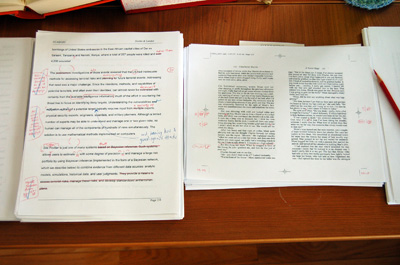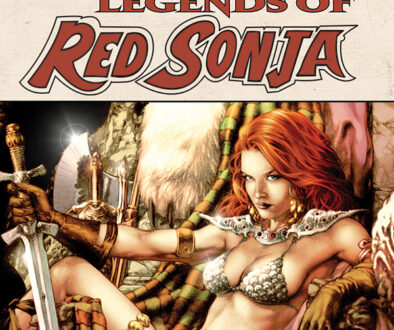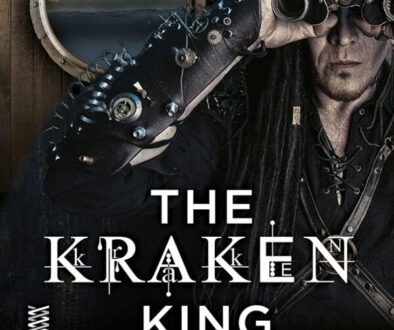My first time interviewing someone else — and it's someone awesome!
So, a couple of weeks ago I got this really fabulous e-mail from a proofreader who got a chance to look over Demon Moon before it went to the final printing. So there I was flushing and kicking my toe in the dirt, all “aw shucks†when the sneaky and manipulative part of me thought: w00t! I’m totally going to pressure her for an interview, because I’m fascinated by all aspects of publication, and how the book gets from my little imagination out into the great big world.
And, because of certain issues arising in the blogosphere (those pesky typos, gah!) and my recent *headdesking* experience with colons and my own ARCs, I thought: this would be a great time to have her guest here.
So I sent her a reply, and finally really looked at her e-mail address, and was like: Oh, HOLY CRAP! I LURK AT YOUR BLOG!!!
So I’ve been reading Jennie’s B(ook)log for a while now, but had no idea she was a proofreader (although I should have known, since there’s nary a typo on her site.) But really, she has great taste in books (obviously), makes hilarious videos (that I wish we saw more often, *g*), and just all around is really great for letting me use her like this.
So, here’s what I thought of asking — if you have any questions, I’ll pass them on to her and see if I can bribe her with something to answer them.
Any typos here are my fault, by teh way. ‘Cuz I’m just a righter. And I apologize in advance for my little insertions, ‘cuz I’m also a dork.
1) Tell us a little about yourself, and what you like to read for pleasure.
Well, I’ve been living in NYC for about five years working in the production department of one of the big trade publishers. That means I deal with arranging the manufacture of the physical book—getting it typeset, determining all the paper/printing/scheduling details, and making sure the manufacturing costs stay within budget. It’s (generally) a lot of fun, and I love my job. I am an avid reader, mostly of romances, though I also read mysteries, fantasy, some science fiction, and plain old fiction. I am a confirmed optimist, so books with an HEA work best for me.
2) When did you start proofreading?
I am fairly new to proofreading, have been doing it for about two years. All copyediting and proofreading is done on a freelance basis, and I do it in addition to my 9-5 job. It keeps me busy, and I have to make sure I don’t take on too much. Or I wouldn’t have time to read for fun, and that would not do at all!
3) How did you start? Did you know someone, have an internship, answer an ad?
As soon as I started working in publishing and learned how proofreading worked, I knew I wanted to get in on it. Getting paid to read? Yes, please. But since I don’t edit in my 9-5 job, I didn’t have the skills or experience to get work. NYU has a publishing department in their continuing education school, so I took a lot of classes there and got their Certificate in Editing. I was not overly impressed by the quality of the teaching in some of my classes, but I did learn a lot. After that I felt ready to start taking on jobs. I’m lucky that I work with a lot of production editors (the people who hire proofreaders), so I went to those I was friendly with and asked if they’d try me out. They started me on easy jobs–I did a lot of mass markets that were being re-run from previously published hardcover editions. Obviously there would be few mistakes in that sort of book. And once I proved I was good, I moved on to more complicated things.
4) What are the typical education requirements for proofreading? Do you have to take any tests?
See #3 about my education. There aren’t any hard and fast rules about qualifications for proofreaders. Most companies have a proofreading test that they will give prospective freelancers. Editors are usually wary of trying new people out, for good reason. If they use someone and that person does a crappy job, they’re going to have to have it redone later, wasting money and possibly putting the book behind schedule. So it’s not the easiest thing to break into.
I think what you need most to be a good proofreader (well, beyond basic intelligence) is a sharp eye and a LOT of patience. You have to look at every single word, and make sure it’s the right word, and it’s spelled correctly, and it’s used correctly, and it’s punctuated correctly. And you have to be willing to stop reading and look up anything you don’t know. I do not know how to spell every word in the English language, that’s for damn sure; my dictionary is well-thumbed. And I often run across a sticky grammar problem I need to look up. It is very different from just reading–I often feel like I’m staring at the words so hard I’m sure to go cross-eyed.
5) If someone wanted to become a proofreader, is it something they could do full-time? (Especially living in high-cost New York?)
Some people do edit full-time, though I think most of them do copyediting as well (the pay rate is higher for copyeditors). And lots of them don’t live in NYC—manuscripts get mailed back and forth across the country all the time.
6) As an author, I see the manuscript at the revision stage and copy-edits (all of the changes are made to the manuscript directly) and at the galley stage (when it’s been set into the format it’ll be printed in, and often made into ARCs.) At what point of the process do you see the manuscript?
I should probably note here that my answers only apply to print books. I imagine the process is quite different for e-publishers; my only experience is with print, so I don’t know. They probably edit on computer–gasp! (We are old-fashioned and do all of our editing on paper, which I love as I’d hate to stare at a computer any more than I already do.)
The proofreader sees the manuscript after it’s been typeset. The author’s Word file has been flowed into a page layout program (InDesign or Quark) and the resulting page proofs look just like printouts of the pages of a book. Most people have read an ARC—that is the set of pages the proofreader works on. The proofreader’s job is to take the page proofs and compare them to the copyedited manuscript. We make sure that none of the text has been dropped in layout and that all the copyeditor’s and author’s corrections have been made correctly. And we check that the layout of the page is done correctly. For a fiction book this is very straightforward, as it’s usually all just text. We only have to look out for a few technical problems like word spacing (the justification of the type on some lines can make the spacing between words all wonky) and bad line breaks–like this:
On June 5, everyone should go and buy Demon Moon by Meljean B-
rook, because it’s really awesome.
I don’t think Ms. B-rook would appreciate that too much. 😉
Nonfiction books can be trickier because they have more design elements: text boxes, figures with captions, lists, cross-references (ugh, cross-references are killer).
7 ) How deep are the changes that you suggest? Are they on a very superficial level (catching typos) or do you point out anything that needs clarification (very awkward or badly written phrases, and general errors in logic/massive plot holes?)
By the time the manuscript gets to the proofreader, it should be in its final stage. In a perfect world, the proofreader would have to make very few changes, and most of them would be typesetting errors. Corrections made once a book is typeset are more expensive, so we try not to make any unnecessary changes at this point. Of course, there are always errors that were missed by the copyeditor. Beyond what is absolutely wrong, proofreaders have fairly little latitude in what sort of changes they can make. Because the author does not see the proofread pages before the book is printed, she doesn’t get a chance to agree or disagree with any last minute corrections, and the author must be the final word on any artistic writing decision. I may see what I think is less than perfect word choice, but I’m generally not going to change it. (I’m not talking about Meljean’s book, of course.*g*) But if something is awkward or confusing (or just really annoys me), then I would definitely flag it for the editor to look at. Because if it’s confusing to me, chances are it will be confusing to readers as well.
8 ) Is there anything that you hate to see in manuscripts? Any phrase or use that always makes you grit your teeth (especially if you can’t change it)?
I’m having trouble coming up with anything specific… Just the usual clichés that drive most readers nuts. Honest confession: I used to hate semicolons. Tricky little punctuation that always tripped me up. I’d come upon one and have quite the internal debate: Hello, semicolon. What are you doing in this sentence? You’re separating these two clauses. Hmm, are they independent clauses? Are you sure they’re related enough to merit the semicolon? Wouldn’t a period make more sense (and save me a lot of grief)? Oh, all right! You can stay.
I’m an ace at them now. 😉
(Meljean’s note: I love semicolons way, way, WAY too much. You should have seen Demon Moon before Megan Frampton looked at it and I changed them all accidentally to colons. I have cut back since then, but still I like to fondle them between two clauses, shove them hard into the moist space between linked sentences, and make a hot threesome with a list.)
9) Do you find yourself more tolerant or less tolerant of mistakes in printed books now that you’ve been proofreading for some time?
I am more tolerant when I see one tiny little error in a book, because I know that occasionally mistakes get through. We are human. I would like to think that I catch every single typo in every single book I work on, but I know that I don’t. I am less tolerant when I see a book that is littered with mistakes, because I know that someone did not do their job properly. And it’s just embarrassing, for the author and the publisher.
(Meljean’s note: typos in my printed books make me want to cry. In other books, I think I’m of pretty much the same mind.)
10) Do you proofread in one genre, or do you receive a variety of manuscripts? Have you gotten any pleasant surprises and loved something you’d never have looked at otherwise? Do you ever get to request a specific project, or are they always assigned?
I do work for a few different imprints, so it’s a pretty wide variety. My favorites, of course, are romances because that’s what I read most often for fun. But I’ve also done some classics, nonfiction, lots of mysteries, even some poetry. The variety is actually one of my favorite things about proofreading. If left to my own devices, I would rarely venture out of my beloved genres. Proofreading forces me to read lots of different stuff, and I often find myself enjoying something that I wasn’t sure I was going to like. I haven’t had too many nightmare jobs—since my proofreading work is “extra” and not my principal source of income, I can turn down any project I don’t want. Someone once offered me this enormously long military history book, and I just had to laugh. Pass!
I haven’t ever requested a specific project, but I guess I could if I knew when it was coming up and the scheduling worked out. I might just have to see about getting Demon III—do you have a title yet? Is it about Michael, huh, huh, is it? 🙂
(Meljean’s blatant promo: DEMON NIGHT, and it’s out in February 2008. But it’s not Michael. It’s Drifter and a chick we haven’t met yet, but who is currently cowering in a telephone booth.)
11) Does proofreading a book ever get in the way of your enjoyment of a novel? Have you ever stopped proofing to just read, then had to go back and finish marking it up?
Yes! I’m awful about this even when reading for fun. I always get excited about what’s going to happen and flip forward to find out. I do it even more when I’m proofreading, because I have to read so much more slowly. I’m sure I did it while working on Demon Moon—how in the world are Colin and Savi going to have an HEA?? It’s never going to work, they’re doomed, booo! *sniff* LOL.
12) How many times/different people usually end up looking at the book before it goes to final printing?
Let’s see, there’s the acquisitions editor (often more than one), the production editor, the copyeditor, and the proofreader. And someone is often hired to do a straight read-through, either in the proofreading stage or after the proofreading changes are made. (Because the proofreader is constantly flipping between the manuscript and the set pages, sometimes you can get a missing-the-forest-for-all-the-trees problem. A fresh pair of eyes to just read straight through is often a good idea.) So that’s a minimum of 4-5 people who are really concentrating on editing.
And for illustration, Jennie has provided a picture of her current project.

(Meljean’s note: on the left side is the manuscript marked up from the copy-editing. On the right is the galley page, typeset in columns (probably a mass-market, judging by the size.) And my appreciation for proofreaders is now unbelievably high, even more than it was before, because going word by word like that would drive me INSANE. It’s hard enough doing one manuscript or set of galleys, let alone checking between two at the same time.)
I’m glad you aren’t insane, Jennie, although I would have thought that going through all of those colons in Demon Moon would have done it to anyone 🙂 … and thank you so much!



